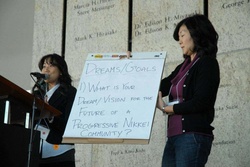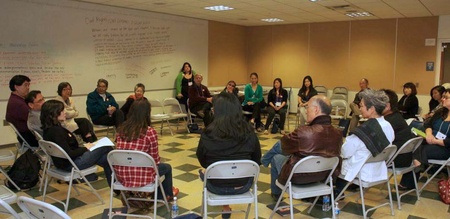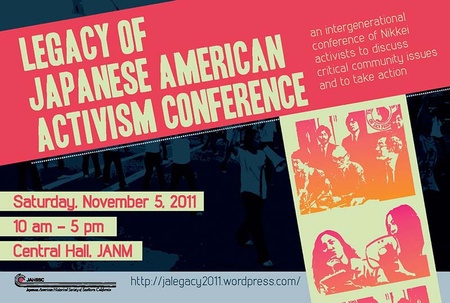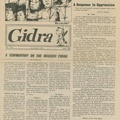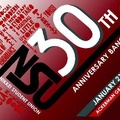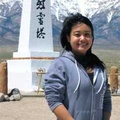When we think about Japanese American activism we may immediately think of the iconic 1980s Redress Movement. But what about JA activism today?
Glenn Omatsu defines JA Activism as “not simply a set of beliefs or a series of actions; more accurately, it is a way of living. It is practicing militant humility in transforming society while transforming ourselves.”
Rather than defining JA Activism as what it is today, delineating this entity by a set time period, we should address it as how has its legacy been passed down and expanded over the years.
On November 5, 2011, a major conference took place at the Japanese American National Museum in Little Tokyo Los Angeles. The Legacy of Japanese American Activism: Building an Intergenerational Community was a multigenerational conference, seeking to initiate meaningful dialogue that would result in concrete plans of action to address current issues in the JA community.
Oftentimes issues became associated with a particular period and generation, but they transcend time. Through rigorous action and shared leadership, we come to recognize that these issues are not specific to any one timeframe: we still deal with racism, civil rights’ injustices, and battles with ethnic identity. The event planning committee involved Iku Kiriyama, Glenn Omatsu, Alan Nishio, Kathy Masaoka, Mark Masaoka, Evelyn Yoshimura, Traci Kato-Kiriyama, Aaron Hamachi, Kei Nagao, Tony Osumi, Sean Miura, and several UCLA Nikkei Student Union students.
In preparation for the conference members of NSU at UCLA had the opportunity to interview key figures in the Japanese American community. Cyndi Tando, current Secretary of NSU, recalls the experience as one that was eye-opening, hearing these stories firsthand and being able to converse with these individuals helped her learn more about the Nikkei history and community. For her and the other interviewers, it was a chance to record and pass on these stories in the hopes of not only raising awareness but for the younger generation to take advantage of and take initiative in preserving the Nikkei legacy.
The conference took on a dynamic and engaging format. Rather than a panel of activists speaking to an audience the attendees were divided into workshops, which allowed for a more personal and direct dialogue. Topics included “Activism in the Great Recession,” “Civil Rights and Civil Liberties,” “Educate to Transform!,” “LGBT[JA]Q?,” and “The Role of Community Activism in Little Tokyo.” Furthermore, these workshops allowed everyone to be an active participant. Not only was this conference a learning experience, but it also shows that every individual has a voice and has something to contribute. No issue can be resolved in one day, and it is through great humility and an open mind that solutions to such issues can be developed and implemented. Hiromi Aoyama, one of the co-Producers for this year’s NSU Culture Night, noticed how people kept in contact with one another following the event, showing a sustainable and growing foundation across generations through this conference.
The greatest impact of activism resides in the power it has to raise awareness for the power and potential within the individual. However, these issues span across generations, and it is a reciprocated relationship. Each generation has as much to contribute to the activists who preceded their generation in addition to what one generation can pass on to the next.
Although this particular conference emphasized Japanese American activism, much of the accomplishments and drives of these individuals go beyond the Nikkei and Asian American community but instead addresses activism on a greater level for the improvement of human rights for all people.
The seeds of activism can be readily and widely sown, but it is to nurture these seeds and allow them to grow into a movement that brings about the beginnings for change. Every generation will bear new faces and offer a new perspective, and hopefully events such as this conference will foster and inspire the new generation of activists.
To learn more about the Japanese American Activism Conference, visit:
http://jalegacy2011.wordpress.com/
http://www.facebook.com/jalegacy2011
© 2011 Yoshimi Kawashima



